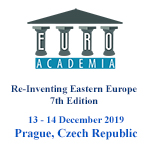Euroacademia Conferences
 Europe Inside-Out: Europe and Europeanness Exposed to Plural Observers (9th Edition) April 24 - 25, 2020
Europe Inside-Out: Europe and Europeanness Exposed to Plural Observers (9th Edition) April 24 - 25, 2020 Identities and Identifications: Politicized Uses of Collective Identities (9th Edition) June 12 - 13, 2020
Identities and Identifications: Politicized Uses of Collective Identities (9th Edition) June 12 - 13, 2020 8th Forum of Critical Studies: Asking Big Questions Again January 24 - 25, 2020
8th Forum of Critical Studies: Asking Big Questions Again January 24 - 25, 2020 Re-Inventing Eastern Europe (7th Edition) December 13 - 14, 2019
Re-Inventing Eastern Europe (7th Edition) December 13 - 14, 2019 The European Union and the Politicization of Europe (8th Edition) October 25 - 26, 2019
The European Union and the Politicization of Europe (8th Edition) October 25 - 26, 2019 Identities and Identifications: Politicized Uses of Collective Identities (8th Edition) June 28 - 29, 2019
Identities and Identifications: Politicized Uses of Collective Identities (8th Edition) June 28 - 29, 2019 The European Union and the Politicization of Europe (7th Edition) January 25 - 26, 2019
The European Union and the Politicization of Europe (7th Edition) January 25 - 26, 2019 7th Forum of Critical Studies: Asking Big Questions Again November 23 - 24, 2018
7th Forum of Critical Studies: Asking Big Questions Again November 23 - 24, 2018 Europe Inside-Out: Europe and Europeanness Exposed to Plural Observers (8th Edition) September 28 - 30, 2018
Europe Inside-Out: Europe and Europeanness Exposed to Plural Observers (8th Edition) September 28 - 30, 2018 Identities and Identifications: Politicized Uses of Collective Identities (7th Edition) June 14 - 15, 2018
Identities and Identifications: Politicized Uses of Collective Identities (7th Edition) June 14 - 15, 2018
A Trauma of Committee of Union and Progress: Reconsidering the First Balkan War (1912 – 1913)
-
-

-
Presentation speakers
- Hikmet Çağrı Yardımcı, Hasan Kalyoncu University, Gaziantep, Turkey
Abstract:
As Ottoman Empire was collapsing many nations who had lived under Ottoman rule began to riot underway to establish their own independent states. Committee of Union and Progress (CUP) (İttihat ve Terakki Partisi), which was an opposed group founded to transform the monarchic Ottoman system into constitutional democracy, undertook the protector status of the state at these times. CUP, as a political group, which had several bureaucrats at the top of the Ottoman hierarchical frame, was more institutionalized and organized structure of Young Turks. CUP gave a big importance to the Balkan issues since Young Turks’ political and intellectual settlement had started from these lands. Thus a big effort made to tie Balkan nations, who rebelled to Ottoman Empire, with –recently- centralized Ottoman Empire. Even if these efforts worked to some extent, with Balkan wars CUP faced with its one of the biggest traumas. Then CUP’s point of view to the Balkans has totally changed in the direction of hatred, the opposite way round to previously. This study is twofold: Firstly it aims to reexamine the Balkan Wars regarding to CUP and its centralized policies. On the other hand, as a different perspective, this work focuses on emotional cues of CUP that are contains contradictory feelings, especially ‘love and hate’. Based on this, an inter-disciplinary approach of the Balkan wars history will be reevaluated by linking centralization policies of CUP and traumatic results of these moves.
-
Related Presentations

Housing the New Identity: Images of a Good Life in the Post-Socialist City
- Dalia Čiupailaitė-Višnevska













